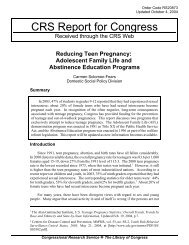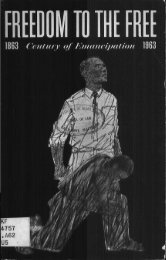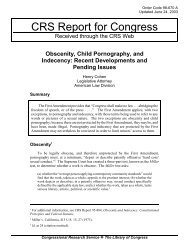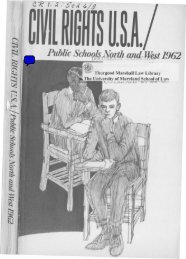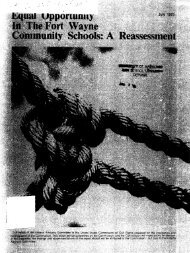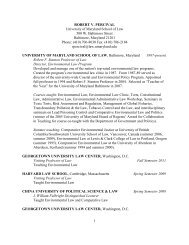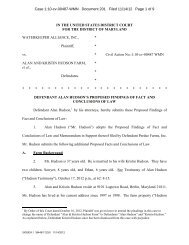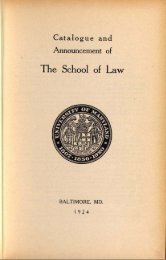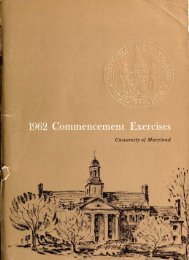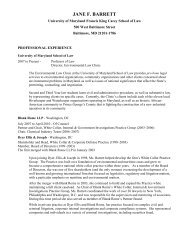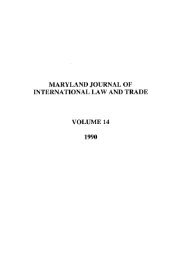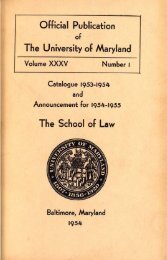University of Maryland School of Law : Catalog, 1988-1989
University of Maryland School of Law : Catalog, 1988-1989
University of Maryland School of Law : Catalog, 1988-1989
You also want an ePaper? Increase the reach of your titles
YUMPU automatically turns print PDFs into web optimized ePapers that Google loves.
each student will select a rulemaking<br />
proceeding to follow and will<br />
develop a set <strong>of</strong> written comments<br />
to be used in that rulemaking. The<br />
course will enable students to gain<br />
insights into how statutory directives<br />
are translated into regulations<br />
and how private parties can influence<br />
environmental policy decisions.<br />
Class sessions will combine<br />
exploration <strong>of</strong> legal and policy issues<br />
with consideration <strong>of</strong> the strategic<br />
dimensions <strong>of</strong> practicing before<br />
administrative agencies.<br />
Day/Evening (LAW 531 D) at<br />
4:30 p.m. —Mr. Percival<br />
Estate and Gift Taxation (2)<br />
This course examines the general<br />
structure <strong>of</strong> the federal estate and<br />
gift taxes; tax consequences <strong>of</strong> inter<br />
vivos transfers; joint interests;<br />
life insurance; powers <strong>of</strong> appointment;<br />
determination <strong>of</strong> the taxable<br />
estate and taxable gifts; the marital<br />
deduction and split gifts; and credits,<br />
computation and payment and<br />
the generation skipping tax.<br />
Evening (LAW 521 H)—Mr. Stiller.<br />
Estate Planning (4)<br />
This course covers essentially the<br />
same subject matter as the course<br />
in Estates and Trusts, i.e., the gratuitous<br />
disposition <strong>of</strong> property, including<br />
(a) intestate succession;<br />
(b) wills, with emphasis on execution,<br />
revocation, contest and probate;<br />
and (c) trusts, with emphasis<br />
on problems involved in their creation,<br />
termination and administration.<br />
In addition it will provide a<br />
general introduction to the structure<br />
<strong>of</strong> federal estate and gift taxation,<br />
and the relationship <strong>of</strong> this<br />
taxation to the material on estates<br />
and trusts in developing and carrying<br />
out the client's estate plan.<br />
A student may not take for<br />
credit both this course and either<br />
Estates and Trusts or Estate and<br />
Gift Tax. As a prerequisite for the<br />
Estate Planning Seminar, a student<br />
may take either this course or both<br />
Estates and Trusts and Estate and<br />
Gift Tax.<br />
Day (LAW 527 C)— Mr. Gohn.<br />
Estate Planning Seminar* (3)<br />
This seminar is devoted to problems<br />
and techniques <strong>of</strong> estate planning<br />
and includes a consideration<br />
<strong>of</strong> property, wills, trusts, future interests,<br />
insurance and tax law in<br />
relation to the arrangement and<br />
disposition <strong>of</strong> estates during life<br />
and death.<br />
P: Estate Planning, or both Estates<br />
and Trusts and Estate and Gift Taxation.<br />
Day (LAW 523 C)—Not <strong>of</strong>fered<br />
<strong>1988</strong>-89.<br />
Estates and Trusts (3)<br />
This course examines the gratuitous<br />
disposition <strong>of</strong> property, including<br />
(a) intestate succession;<br />
(b) wills, with emphasis on execution,<br />
revocation, contest and probate;<br />
and (c) trusts, with emphasis<br />
on problems involved in their creation,<br />
termination and administration.<br />
Day/Evening (LAW 524 C) at<br />
5:05 p.m.—Mrs. Brumbaugh; Summer<br />
<strong>1988</strong>—Mr. E. Goldberg.<br />
Evidence (3) or (4)<br />
This course is a study <strong>of</strong> the problems<br />
<strong>of</strong> pro<strong>of</strong> in civil and criminal<br />
trials, including coverage <strong>of</strong> the<br />
important rules <strong>of</strong> evidence and<br />
the impact <strong>of</strong> the Federal Rules <strong>of</strong><br />
Evidence. The manner <strong>of</strong> examining<br />
witnesses and presenting evidence<br />
is considered, and the effects<br />
<strong>of</strong> such sometimes inconsistent<br />
goals as the presentation <strong>of</strong> all<br />
important, relevant information to<br />
the trier <strong>of</strong> fact and the exclusion<br />
<strong>of</strong> evidence on grounds such as unreliability,<br />
privilege and undue<br />
prejudice are examined. In the 4credit<br />
section, taught by Pr<strong>of</strong>essor<br />
Hornstein but not <strong>of</strong>fered in<br />
<strong>1988</strong>-89, the subject matter is examined<br />
more intensively.<br />
Da? (LAW 508 B)— Mr. Brumbaugh,<br />
Mr. Gibson, Mr. Levy; Evening<br />
(LAW 508 F)— Mr. Goldstein.<br />
Externships (4) to (13)<br />
A limited number <strong>of</strong> full semester<br />
externships allows students to earn<br />
credit for work with governmental<br />
or public interest groups. Past externships<br />
have included the National<br />
Wildlife Federation and the<br />
Center for <strong>Law</strong> and Social Policy<br />
and its cognates, the National<br />
Women's <strong>Law</strong> Center and the Media<br />
Access Project. Before a student<br />
will be permitted to participate<br />
in such a program certain<br />
conditions must be met: (1) The<br />
requesting student must find a faculty<br />
member with expertise in the<br />
area who is willing actively to su-<br />
77



